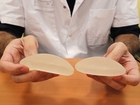The antiretroviral drug efavirenz is more effective at treating children infected with HIV than the more commonly used and cheaper nevirapine, according to a study out Tuesday.
The study is being billed as the first large-scale comparison of first-line treatments for HIV-positive children, and could have an impact on care in poor parts of the world, where most of them live.
 Full Story
Full Story
Breast implants may delay cancer diagnosis in women, said a study Wednesday that urged a thorough probe into the potential health risks of this type of cosmetic surgery.
In a review of 12 earlier studies of breast cancer patients, a team of epidemiologists from Canada found that women with implants had a 26 percent higher risk of being diagnosed at a later stage of the disease.
 Full Story
Full Story
Cancer research tends to involve small studies focused on a single therapy, often falling short of scientific standards seen in other medical investigations, said a study released Monday.
The trend may be driven by a desire to speed treatments to market, but raises questions about how well experimental cancer-fighting therapies will work in practice, said the findings in the Journal of the American Medical Association.
 Full Story
Full Story
Men who are obese in their early 20s are twice as likely as peers of average weight to die before reaching the age of 55, a study said Tuesday.
Writing in the journal BMJ Open, a team of researchers reported on a 33-year study of 6,500 Danish men who were 22 years old in 1955.
 Full Story
Full Story
Children born outside the United States have a lower risk of asthma, skin and food allergies, and living in the United States for a decade may raise a person's allergy risk, said a study on Monday.
The research in the Journal of the American Medical Association suggests that certain environmental exposures could trigger allergies later in life, overcoming the protective effects of microbial exposure in childhood.
 Full Story
Full Story
The deadly H7N9 bird flu strain claimed a new victim on Monday when a hospital patient died in China, state media reported, bringing the death toll from the recently identified virus to 24.
A patient surnamed Chen died in the eastern city of Shanghai after 12 days of medical treatment failed, Xinhua news agency said. China has recorded more than 120 cases of H7N9 infection so far.
 Full Story
Full Story
Chinese health officials say the 4-year-old son of a man infected with a new strain of bird flu has also caught the virus.
Shandong province's health department says there is no evidence of human-to-human transmission, and that the boy is in stable condition at a hospital.
 Full Story
Full Story
They sweep. They swab. They sterilize. And still the germs persist.
In U.S. hospitals, an estimated 1 in 20 patients pick up infections they didn't have when they arrived, some caused by dangerous 'superbugs' that are hard to treat.
 Full Story
Full Story
Gene analysis of malaria parasites has pinpointed western Cambodia as the hotspot of strains that are dangerously resistant to artesiminin, the frontline drug against the disease, scientists said on Sunday.
An international consortium of researchers unraveled the genetic code of 825 samples of the Plasmodium falciparum parasite from Burkina Faso, Gambia, Ghana, Mali, Thailand, Vietnam and from northeastern and western Cambodia.
 Full Story
Full Story
Plastic surgery to remove fat and excess skin on the upper arms has gained appeal in the United States, where the procedure has exploded in popularity since the year 2000, experts said Monday.
More than 15,000 U.S. women had the procedure known as arm lifts, or brachioplasty, done last year, at a cost of $61 million nationwide, according to the American Society of Plastic Surgeons.
 Full Story
Full Story



